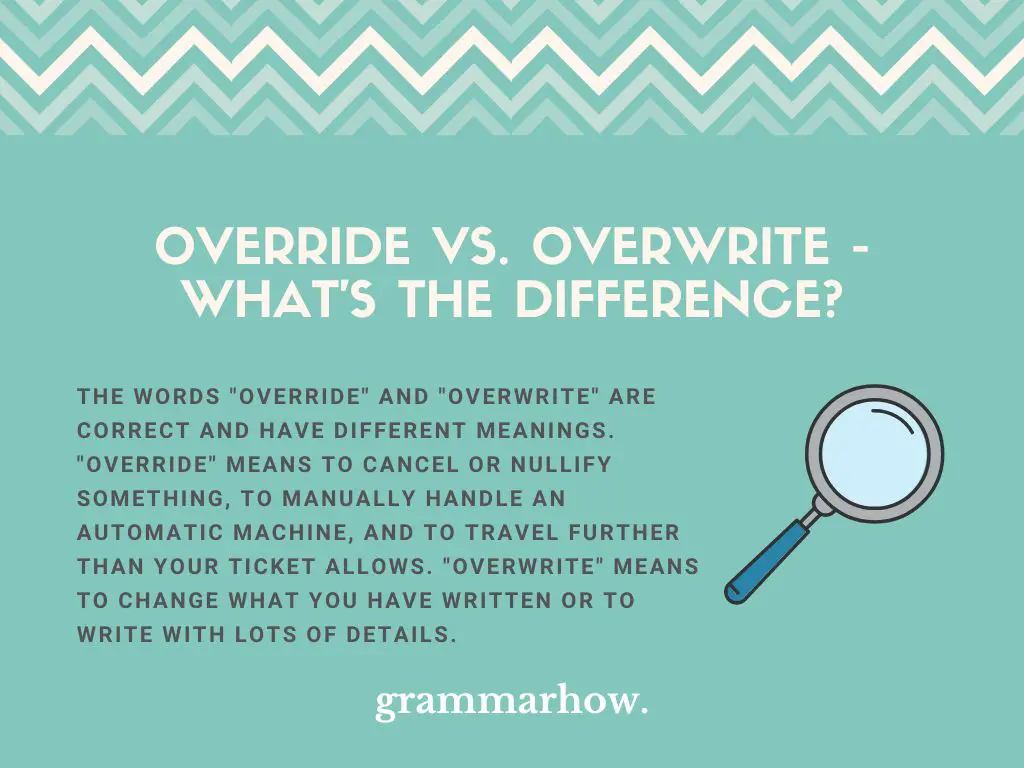“Override” and “overwrite” are words that can confuse us since, as their spellings are very alike, we might think that they have similar meanings or even that they are synonyms. Do you have this doubt? Keep on reading and you will find the information you need in this article.
Override vs. Overwrite – What’s the Difference?
The words “override” and “overwrite” are correct and have different meanings. “Override” means to cancel or nullify something, to manually handle an automatic machine, and to travel further than your ticket allows. “Overwrite” means to change what you have written or to write with lots of details.

Although these two words’ spellings differ in one letter, they are neither synonyms nor interchangeable words.
Override
“Override” is a verb that has more than one meaning. Firstly, it means to void something, like to “override a document”, and it also means to operate an automatic machine by hand. Lastly, it’s used when you travel on public transportation and go further than what you have paid for.
We decided to go to the Cambridge Dictionary to find the meaning of this word and we found all the definitions of “override” mentioned in the previous paragraph.
Now we can see some examples of how to use “override” properly in a sentence.
- Our boss changes his mind all the time, so this time, he has decided to override the document and change all the agreements.
- My ex-husband’s lawyer has advised him to override the changes we had made in our last meeting.
- When I realized the machine was not working well, I decided to override the autopilot and handle it myself.
- Hi Jim, could you work extra hours today? We need you to override the data.
- I know you love adventures and risky situations, but I don’t think we should override.
Overwrite
The verb “overwrite” has two meanings. For starters, it means to replace something you have written, either by hand or on the computer. On the other hand, it also means to write in such an unnecessary detailed way that the meaning of the text is not clear.
We visited the Cambridge Dictionary and we were not surprised to find the definitions explained above as the two possible meanings of this verb.
Let’s see now some examples of the word “overwrite” used correctly in a sentence.
- How many times will you want me to overwrite this letter? I have done it five times already.
- Remember the book she gave me for my last birthday? I started reading it but, honestly, I cannot continue. The author overwrites a lot; there are so many details and much more adjectives than necessary!
- One of my clients sent me a document he wants me to overwrite. I wrote this for him last week, but I don’t care because he pays me.
- I don’t know if she believes herself to be Jane Austen or what, but I cannot stand her elaborate way of writing. Don’t you think she overwrites a lot?
- You cannot overwrite the existing options; you can add ones if you want but do not erase the others, please.
Which Is Used the Most?
To check some word’s popularity, a good tool to use is Google Ngram Viewer as it provides very accurate information. Let’s see then which information we get for the words “override” and “overwrite”.

On one hand, we found that the word “overwrite” was not popular at all before 1980. During this decade, although not much, the red curve starts to go up a little.
On the other hand, the word “override” has always had more popularity than “overwrite”. The blue curve shows stability in its use until the 1930’s when it begins to rise. By the 2010s, however, the curve begins to go down again.
Final Thoughts
“Override” and “overwrite” are English words that have different meanings. While “override” means to void something, to use a machine with your hands, and to go further in distance than what your ticket states. “Overwrite” means to change a piece of writing or to write in a very detailed way.

Martin holds a Master’s degree in Finance and International Business. He has six years of experience in professional communication with clients, executives, and colleagues. Furthermore, he has teaching experience from Aarhus University. Martin has been featured as an expert in communication and teaching on Forbes and Shopify. Read more about Martin here.
